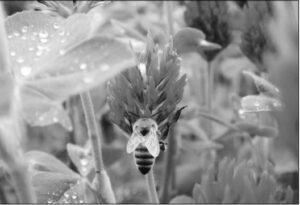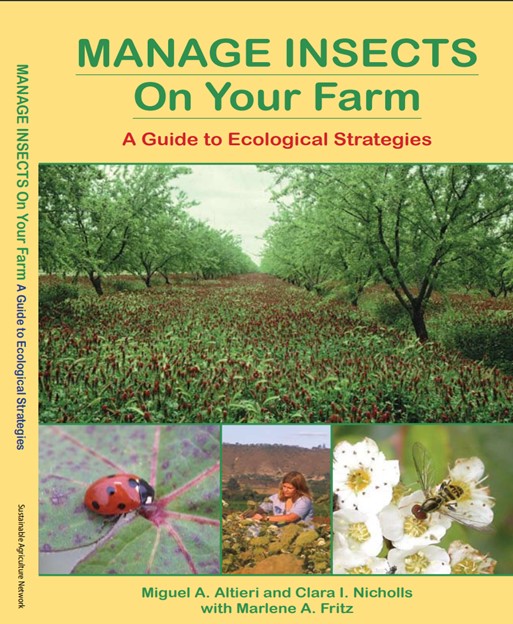Manage Insects on Your Farm
A Guide to Ecological Strategies
Miguel A. Altieri and Clara I. Nicholls
with Marlene A. Fritz
Manage Insects on Your Farm – Agricultural pests — insects, weeds, nematodes and disease pathogens — blemish, damage or destroy more than 30 percent of crops worldwide. This annual loss has remained constant since the 1940s, when most farmers and ranchers began using agrichemicals to control pests.
Agrichemical methods of protecting crops are costly to the farmer, potentially harmful to the environment and, despite widespread use, have not proved 100-percent effective. Problems persist due to pest resistance and the uncanny ability of pests to overcome single-tactic control strategies.
A National Academy of Science 1997 Proceedings paper, “A Total System Approach to Sustainable Pest Management,” called for “a fundamental shift to a total system approach for crop protection [which] is urgently needed to resolve escalatory economic and environmental consequences of combating agricultural pests.”
Many farmers are seeking such an approach, one that relies less on agrichemicals and more on mimicking nature’s complex relationships among different species of plants and animals. Known as “ecologically based pest management” or simply “ecological pest management,” this approach treats the whole farm as a complex system.
The old approach strives for 100 percent control of every pest using one strategy or agrichemical for each pest. The new approach, ecological pest management, aims to manage the whole farm and keep pests at acceptable populations using many complementary strategies.
Ecological pest management is a preventive approach that uses “many little hammers” or strategies’, rather than one big hammer, to address pest problems on the farm or ranch.

A crimson clover cover crop prevents erosion, improves soil, fixes nitrogen and attracts beneficial insects.
Ecological pest management employs tactics that have existed in natural ecosystems for thousands of years. Since the beginning of agriculture — indeed, long before then — plants co-evolved with pests and with the natural enemies of those pests. As plants developed inherent protective mechanisms against pests, they were helped by numerous partners in the ecosystem, for example:
- Beneficial insects that attack crop insects and mites by chewing them up or sucking out their juices
- Beneficial parasites, which commandeer pests for habitat or food
- Disease-causing organisms, including fungi, bacteria, viruses, protozoa and nematodes that fatally sicken insects or keep them from feeding or reproducing.
These organisms also attack weeds.
- Insects such as ground beetles that eat weed seeds
- Beneficial fungi and bacteria that inhabit root surfaces, blocking attack by disease organisms
By integrating these natural strategies into your farming systems, you can manage pests in a way that is healthier for the environment and eliminates many of the problems associated with agrichemical use.
Knowing the life cycles of pests and understanding their natural enemies allows you to better manipulate the system to enhance, rather than detract from, the built-in defenses available in nature.

134 Pages
Manage Insects on Your Farm
 Our 100% Money Back Guarantee:
Our 100% Money Back Guarantee:
If for any reason you decided within 30 days that “Manage Insects on Your Farm” isn’t for you, simply notify us by email and we’ll gladly refund your money – no questions asked. That’s our Ironclad Guarantee! The risk is entirely ours! You absolutely have nothing to lose!
Your Name and Email will Never Be Shared or Given to Anyone.
We keep our subscriber’s privacy sacred. We do not sell or rent your personal information to other parties. What’s more you can always unsubscribe at any time!
Warmest Regards,
Coyalita Linville
Copyright © 2023 – 2024 Sunrise-Sunset-Nature-Gardens.com. All Rights Reserved Privacy Policy – Earning Disclaimer – Terms of Use – Contact Us
Open modal

